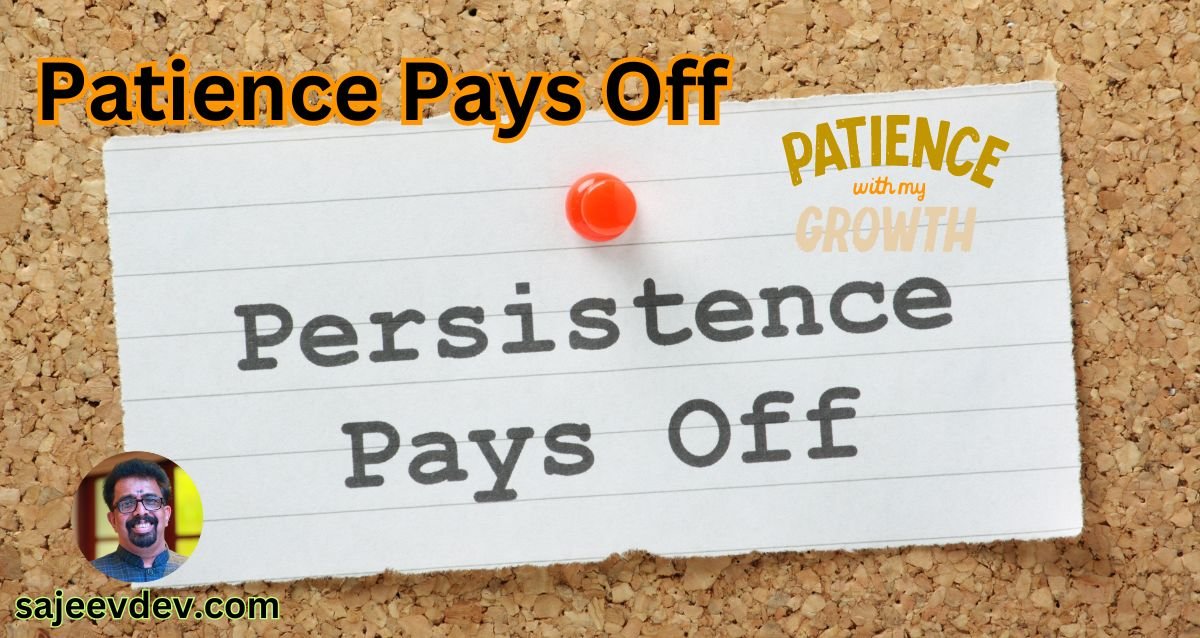In a world dominated by rapid advancements and immediate results, the significance of patience often becomes overshadowed
In a world dominated by rapid advancements and immediate results, the significance of patience often becomes overshadowed. The contemporary society we inhabit, fueled by technological innovations and instant access to information, increasingly glorifies instant gratification. This relentless pursuit of quick results can detract from recognizing the inherent value of patience, a quality that is essential for achieving true success over time.
Patience may be defined as the capacity to endure delay, trouble, or suffering without becoming annoyed or anxious. In today’s fast-paced context, this attribute frequently appears to be at odds with the impulsive tendencies of modern life. Many individuals find themselves caught in a cycle of seeking quick fixes, whether it be through rapid consumption of media, instant delivery services, or even accelerated career advancement. This mindset can undermine one’s ability to cultivate the persistence necessary for reaching meaningful goals.
Furthermore, research suggests that the ability to delay gratification is closely linked to various positive life outcomes such as academic success, emotional well-being, and even physical health. The anecdote of the marshmallow experiment highlights how those who exhibited patience were more likely to achieve favorable results later in life. This evidence supports the idea that fostering patience is not just a virtue but an indispensable skill in today’s world.
As we navigate through our fast-paced society, understanding and embracing the value of patience becomes crucial. Recognizing that worthwhile achievements often require sustained effort over time allows individuals to adopt a more strategic approach toward their goals. Cultivating patience and persistent effort can lead to substantial, lasting success, reinforcing the idea that great things often take time to materialize.
The Importance of Patience in Achieving Success
Patience is often viewed as a passive virtue, but in reality, it plays a crucial role in achieving both personal and professional success. The ability to wait for the right opportunities while persistently pushing through challenges can make a significant difference in one’s journey toward success. A compelling example of this can be seen in the story of Steve Jobs, who faced multiple setbacks before he ultimately revolutionized the technology industry. Jobs was known for his patience as he meticulously refined his vision for Apple, emphasizing the importance of waiting for the perfect implementation rather than rushing the process.
Moreover, studies have shown a strong correlation between patience and success. Research conducted by the University of Pennsylvania found that individuals who exhibit higher levels of patience tend to achieve greater academic and professional outcomes. In a survey involving over 1,000 participants, those with higher patience levels reported increased satisfaction in their careers and relationships, suggesting that the ability to remain steadfast during challenging times directly contributes to long-term success.
Additionally, another example can be found in the sports world. The legendary basketball player Michael Jordan faced numerous challenges in his early career, including being cut from his high school basketball team. Rather than giving up, Jordan dedicated countless hours to practice and improvement, eventually becoming a household name. His story exemplifies how persistence and patience not only build skill but also create opportunities for success when the time is right.
In light of these examples and research findings, it becomes evident that patience is an essential component of the success equation. In a world that often seeks immediate results, cultivating the ability to wait and work diligently can yield extraordinary outcomes. Embracing patience, therefore, is not just a waiting game; it is a strategic approach to achieving one’s goals over time.
The Science Behind Patience: Psychological Perspectives
Patience has often been linked to a variety of positive outcomes in both psychological research and everyday experiences. Studies have shown that individuals who practice patience typically enjoy enhanced decision-making capabilities. This improvement arises from the ability to pause and consider options rather than making hasty decisions. Impulsive choices can often lead to regret, whereas a patient approach allows for a more thoughtful evaluation of potential consequences.
Moreover, the relationship between patience and life satisfaction is noteworthy. Research indicates that those who exhibit higher levels of patience tend to report greater overall well-being. This is partially attributed to their capacity for delayed gratification—a concept first popularized by Walter Mischel in the famous “Marshmallow Experiment.” In this study, children were given the choice between one immediate reward or two rewards if they could wait for a brief period. The long-term outcomes for those who were able to delay gratification revealed significant advantages, including better academic performance and healthier lifestyle choices.
Furthermore, patience is intricately connected to mental health. Individuals who cultivate patience often experience reduced stress and anxiety levels. Patience fosters resilience, enabling individuals to approach challenges with a calm and composed mindset. This emotional regulation is essential in coping with the difficulties of life, contributing to personal growth and a sense of fulfillment.
Incorporating patience into one’s life can lead to profound changes, not only in decision-making but also in overall life satisfaction and mental well-being. By understanding the psychological perspectives of patience, individuals can appreciate its value and actively work to develop this essential trait.
Common Pitfalls of Impatience
Impatience can have profound consequences, oftentimes leading individuals to overlook the importance of time and careful planning in achieving meaningful goals. One of the most significant pitfalls of impatience is burnout. When individuals hastily pursue short-term results and neglect self-care, they may find themselves overwhelmed and exhausted. This exhaustion not only diminishes productivity but can also lead to a complete disengagement from the task at hand. As the pressure to succeed builds, the likelihood of burnout increases significantly when patience is cast aside.
In addition, hasty decisions driven by impatience can produce poor outcomes. When individuals rush through important choices, they may fail to consider all relevant factors or weigh potential consequences adequately. This can result in decisions that are not well thought out, jeopardizing long-term objectives. It is crucial to understand that in various contexts, including career development and personal growth, wise and calculated steps taken over time can yield far superior results compared to impulsive actions.
Moreover, societal pressures can further inflame impatience. In an era where instant gratification is often celebrated, individuals may feel compelled to achieve rapid success without regard for the inherent value of the journey. Social media amplifies this phenomenon, showcasing curated highlights of others’ successes, which can lead to feelings of inadequacy and urgency. When individuals compare their behind-the-scenes struggles to others’ apparent achievements, they are more likely to abandon long-term goals, opting instead for easily attainable milestones that may not align with their ultimate aspirations.
The combination of burnout, poor decision-making, and societal pressures underscores the risks of impatience in the pursuit of progress. Recognizing these pitfalls is essential for fostering a mindset that embraces the value of time and perseverance.
Learning to Cultivate Patience
Cultivating patience is essential for not only personal growth but also for achieving long-term success in various areas of life. A practical approach to developing patience involves mindfulness practices, which encourage individuals to stay present and aware of their thoughts and emotions. Mindfulness training can enhance one’s ability to pause and reflect before reacting impulsively, ultimately fostering a greater sense of patience in daily interactions. This can be achieved through techniques such as focused breathing, meditation, or simply taking moments throughout the day to check in with oneself.
In addition to mindfulness, setting realistic goals is an effective strategy for enhancing patience. When individuals create attainable objectives, they learn to appreciate the progress they make over time, rather than rushing toward an end result. This process involves breaking larger goals into smaller, manageable steps. By celebrating small milestones along the way, individuals can cultivate a sense of fulfillment that reinforces their patience, making the journey more enjoyable and less stressful. Furthermore, this gradual progress allows for necessary evaluations and adjustments, fostering resilience and adaptability.
Engaging in self-reflection can also play a vital role in the cultivation of patience. Journaling can serve as an effective tool for this practice; individuals can write about their experiences, emotions, and thoughts concerning challenges that require patience. Prompts such as “What situations test my patience?” or “How do I typically react when I feel impatient?” can encourage deeper insights. Understanding personal triggers can offer clarity, enabling individuals to develop more effective responses over time. Engaging in regular self-reflection not only reinforces the importance of patience but also highlights growth areas to focus on for future development.
The Role of Persistence in Achieving Goals
Persistence is an essential quality that complements patience when it comes to achieving one’s goals. While patience allows individuals to endure the waiting periods inherent in growth and progress, persistence drives them to continue pushing forward despite facing obstacles. Great achievements are rarely accomplished overnight; rather, they are often the result of sustained effort over time, requiring both patience and tenacity.
There are numerous case studies that exemplify the impact of persistence in the face of challenges. For instance, Thomas Edison famously failed over a thousand times before successfully inventing the light bulb. Edison’s unwavering commitment to his vision despite numerous setbacks demonstrates how persistence can transform challenges into achievements. Similarly, J.K. Rowling faced rejections from multiple publishers before finally finding one willing to publish her first Harry Potter book. Her ability to remain persistent, even when faced with adversity, eventually led her to become one of the most successful authors in history.
Moreover, the synergy between patience and persistence is vital for navigating the complexities of goal attainment. When individuals encounter hurdles, their patience allows them to accept the slow pace of progress, while their persistence encourages them to maintain focus and continue working tirelessly towards their objectives. This combination is particularly important in highly competitive fields, where temporary failures can discourage others from pursuing their goals. Those who possess both qualities are often able to rise above setbacks and emerge stronger and more determined.
Ultimately, the journey towards accomplishing great things requires a blend of patience and persistence. These two traits not only facilitate resilience in the face of challenges but also serve as a foundation for sustainable success. By embodying both patience and persistence, individuals can navigate their paths more effectively and work towards their dreams with unwavering determination.
Waiting for the Right Moment: Trusting the Process
In various domains of life, the power of timing plays a crucial role in achieving success. It is often said that great things take time, and this adage resonates with the importance of recognizing and waiting for the right moment. Success is not merely a product of hard work; equally significant is the process of trusting that efforts will yield the desired results when conditions are optimal.
In the business world, the concept of timing is frequently highlighted. For example, consider the launch of a new product. A company may invest considerable resources into research and development, but if the product is introduced before the market is ready, it may fail to attract customers. Conversely, waiting for a surge in demand, informed by careful market analysis, can lead to exponential growth. This illustrates how hard work, timely execution, and patience can culminate in remarkable success.
Similarly, in the realm of art, artists often reiterate the significance of allowing ideas to mature. The creative process can take time, and many renowned painters, authors, and musicians acknowledge that their best work emerged not immediately, but after a prolonged period of reflection and refinement. For instance, the celebrated artist Vincent van Gogh created some of his most notable masterpieces after years of experimentation and self-doubt, showcasing the value of patience in the creative journey.
In sports, athletes exemplify the relationship between timing and success. Preparation, training, and perseverance are fundamental to an athlete’s performance, yet the right moment, such as the exact timing of a jump or a strategic decision during a game, can be the deciding factor in victory. Famous sports figures often describe how waiting for key play opportunities has led their teams to achieve remarkable success.
Ultimately, the interplay between patience and timing can amplify achievements across various fields, emphasizing that the journey toward success is as essential as the destination.
Real-Life Testimonials: Success Stories Through Patience
Success often requires a significant amount of time, effort, and most importantly, patience. Numerous individuals have experienced transformative breakthroughs after demonstrating resilience and a willingness to wait for their goals to materialize. These stories showcase that great accomplishments rarely happen overnight but rather unfold through a journey marked by perseverance.
One remarkable example is that of a budding entrepreneur who launched a tech startup. Initially, the founder faced numerous challenges, including funding shortages and market competition. After applying for countless grants and attending pitch competitions, success felt elusive. However, instead of giving in to frustration, the entrepreneur focused on learning from each setback and refining the business model. After three years of dedicated work and unwavering patience, the startup secured significant investment and is now thriving in a competitive industry. This experience underscores the essence of patience as a pivotal driver of success.
Another inspiring story comes from an aspiring author who spent years trying to get published. After receiving numerous rejections from literary agents and publishing houses, the writer opted to hone their craft further and participated in writing workshops. This commitment to improvement not only enhanced their skills but also aligned the author with a supportive community. Eventually, after years of toil and patience, their novel was accepted for publication, leading to both critical acclaim and commercial success. The author’s journey highlights that patience can lead to personal growth, ultimately resulting in achievement.
These testimonials exemplify how patience can be a powerful tool in the pursuit of success. By remaining steadfast and dedicated, individuals can navigate through delays and setbacks. The journey may be long, but the rewards of perseverance often lead to breakthroughs that are worth the wait.
In reflecting upon the insights shared in this article, it becomes apparent that patience is a vital quality that influences the path to success
In reflecting upon the insights shared in this article, it becomes apparent that patience is a vital quality that influences the path to success. The notion that great things take time is a recurring theme found in the stories of many accomplished individuals. Their journeys underscore the understanding that endeavoring towards meaningful goals requires not only hard work but also the unwavering ability to remain patient amidst challenges.
Through a combination of deliberate action and steadfastness, individuals can cultivate resilience, which is essential for overcoming obstacles. The process of achieving substantial goals often presents trials that test one’s commitment and dedication. By embracing patience, individuals position themselves to better navigate these hardships, allowing for growth and learning that ultimately pave the way to success.
It is imperative to recognize that the fruits of one’s labor may not manifest immediately. This understanding encourages a mindset oriented towards persistence rather than impulsivity. Valuing patience enables individuals to appreciate the gradual progression towards their objectives. As they develop this virtue, they foster a deeper connection with their aspirations, leading to greater fulfillment.
In closing, embracing patience as a virtue is an essential step in the pursuit of meaningful achievements. As the journey unfolds, remember that enduring dedication interlinked with patience lays the groundwork for distinguished successes. The acknowledgment that great things take time and effort empowers individuals to remain steadfast in their endeavors. Thus, it is essential to cultivate and celebrate the power of patience throughout life’s various challenges and victories.









